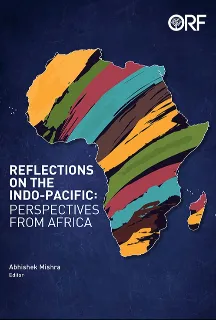Introduction
The Indo-Pacific denotes a vast maritime zone, stretching from the littorals of East Africa and West Asia, across the Indian Ocean and the western Pacific Ocean, to the littorals of East Asia.[1] Some of the world’s large commercial trading routes traverse these waters. This vast geographic and strategic expanse, connecting the Indian and Pacific oceans, is increasingly being viewed as a global centre of gravity that engages and is of interest to many countries. Countries like France, Japan, India, the US, Australia, Germany, the Netherlands, and the UK have developed policies to promote their reach in the region. Although developing international partnerships in the region is not new, the motives to embrace and promote the centrality of the Indo-Pacific in their maritime policies are diverse. While some countries are aiming to balance the competition and shape the maritime architecture in the region, others are developing strategies in response to China’s economic, political, and military expansion. Indeed, the Indo-Pacific is emerging as the new and expanded theatre of great-power contestation, with the African continent at the heart of such competition.
In many ways, the Indo-Pacific is a contested concept without much clarity on what falls within or outside the geopolitical space. While the US’s concept of the Indo-Pacific excludes Africa,[2] countries like India,[3] France,[4] and Japan[5] acknowledge the centrality of African states within their Indo-Pacific strategies. For some time now, external powers have been scrambling to set up naval and military bases in Africa and align with friendly regimes to protect their investments and safeguard the commercial sea lanes from piracy. As a result, African leaders have continuously voiced apprehensions about getting caught in between great power contestations.[6]
Without clearly defining their national interests and power capabilities and taking direct policy positions on the Indo-Pacific, African countries risk getting marginalised from the very process and activities that will impact the continent’s long-term prosperity and interests.[7] As a result, it is becoming increasingly difficult for African states to remain passive bystanders.
The maritime domain is undoubtedly vital for Africa to achieve peace, security, and development.[8] In recent years, African countries have begun to realise the economic potential of harnessing water bodies and slowly shed their continental outlook.[9] They are now adopting maritime security policies as part of broader national security strategies. However, their ability to exert agency while engaging with external partners has been limited due to capacity and resource constraints. Moreover, each African country’s maritime needs and requirements differ. Small African island nations do not necessarily have the same interests or priorities as the littorals in East and West Africa. Therefore, for the African countries to truly reflect their developmental ambitions, they need to exercise collective agency by engaging in different multilateral and minilateral initiatives. Multilateralism matters for small African states as it gives them the best chance to pool resources and ideas to influence global decisions and ensure that their voices are factored in discussions that have a bearing on the continent’s growth and development.
This volume features a compilation of country-specific chapters that explore four main themes for each country included: their position/stance on the emerging Indo-Pacific discourse; their interests, concerns and apprehensions on the developing maritime architecture in the region and their principle maritime security challenges; their possible contribution to the knowledge and discourse on the Indo-Pacific through multilateral and minilateral forums and initiatives; and their views on the emerging major power contestation and role of external powers.
In his chapter on Kenya, Brian Gicheru Kinyua aims to assess the country’s decisiveness as a leading Eastern African economic hub in the geopolitics of the Indo-Pacific. Hamad Bakar Hamad makes a case for Tanzania to emerge as a key partner for Indo-Pacific countries, especially in developing a sustainable blue economy in the Zanzibar region, and fighting the growing menace of illegal, unreported and unregulated fishing. Neha Sinha examines the vitality of Mozambique for the security, prosperity, and stability of the Indo-Pacific region. After all, the Mozambique Channel is a key trading route for goods transiting the Cape of Good Hope to West Asia and beyond. While outlining South Africa’s position on the Indo-Pacific, Denys Reva acknowledges that its maritime foreign policy approach lacks dedicated naval security and governance strategy documents that clearly outline its vision for the maritime space.
Discussing Djibouti’s geostrategic position, Abhishek Mishra examines how the country, which hosts several foreign military bases, plays an outsized role in the politics of the Indo-Pacific and has emerged as a proxy turf and geopolitical chessboard for extra-regional competition. On Nigeria, Dirk Siebeles notes that there is not much for the country to gain from participating in discussions on Indo-Pacific maritime issues as these are often linked to sovereignty questions and the increasing rivalry between India and China, Nigeria’s most important trading partners. However, as the Nigerian experience has shown, a key lesson is the imperative to address maritime security challenges in context with land-based issues.
Kwang Poon notes that throughout Mauritius’s recorded history, it has been the ‘object of desire’ for all major powers due to its geostrategic location. Mauritius is willing to promote and maintain a secure, inclusive, peaceful, free and open Indo-Pacific. It already plays a leading role within the Indian Ocean Commission (IOC) and the Indian Ocean Rim Association by hosting the headquarters of these organisations. As far as the Seychelles is concerned, Malshini Senaratne opines that the island-nation’s international agenda revolves around maritime security, climate change mitigation and post-pandemic economic recovery. The Seychelles must remain mindful of balancing external influences while carefully defining its place within the Indo-Pacific to adopt a more proactive role in protecting its blue growth interests.
Lastly, Satyajit Sen makes a case for why multilateral security for the Small Island Developing States (SIDS) in the Southwest Indian Ocean region under the leadership of the IOC will be a positive engagement. He argues that with increased capabilities, SIDS acting under the IOC and with a common voice may engage with the major powers to secure their backyard and set the agenda on their terms as the geopolitical realities in the era of the Indo-Pacific unfold.
Africa’s role and place in the Indo-Pacific are neither defined nor clearly articulated. But the African countries must determine which specific agendas of the Indo-Pacific—maritime security, marine ecology and resources, capacity building and information sharing, maritime connectivity, and disaster management—to focus on going forward. Unless these countries can articulate their interests proactively and stake a claim in the Indo-Pacific, they will miss out on participating in the decision-making processes on maritime security issues.
Endnotes
[1] Ministry of External Affairs, Government of India, “Prime Minister’s Keynote Address at Shangri La Dialogue,” June 1, 2018.
[2] US Department of State, Government of the United States of America, “A Free and Open Indo-Pacific: Advancing a Shared Vision,” November 4, 2019.
[3] Huma Siddiqui, Ministry of External Affairs, Government of India, “India’s concept of Indo-Pacific is inclusive and across oceans,” November 8, 2019.
[4] Ministry for Europe and Foreign Affairs, Government of France, “France’s Indo-Pacific Strategy,” 2018.
[5] Ministry of Foreign Affairs of Japan, Government of Japan, “Free and Open Indo-Pacific,” April 1, 2021.
[6] Joseph Sany and Thomas P. Sheehy, “Sidestepping Great Power Rivalry: U.S.-China Competition in Africa,” United States Institute of Peace, April 28, 2021.
[7] Denys Reva, “Africa must stake its claim in the Indo-Pacific,” Institute for Security Studies, May 19, 2021.
[8] African Union, “2050 Africa’s Integrated Maritime Strategy (2050 AIM Strategy),” 2012, Addis Ababa, Ethiopia.
[9] Timothy Walker, “From missed opportunity to oceans of prosperity,” Institute for Security Studies, October 13, 2015.
The views expressed above belong to the author(s). ORF research and analyses now available on Telegram! Click here to access our curated content — blogs, longforms and interviews.

 PDF Download
PDF Download



 PREV
PREV


